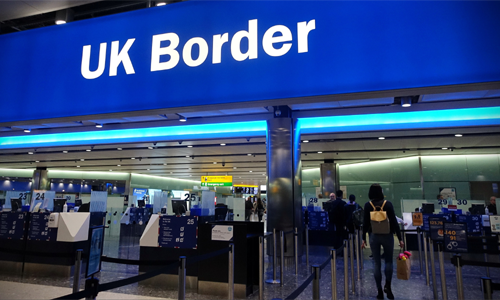From January 1st 2021, Brexit brought changes to the UK; ending the free movement of people, services, and goods travelling between the UK and the EU. These changes will significantly alter how citizens of the UK will live, work and travel.
At Interparcel we've worked hard to ensure the transition to 2021 is as smooth as possible and that our services remain as reliable as ever. Some delays to shipping during the transition period have been inevitable while the systems are adapted, but now the changes are in place, this will become the new normal (a phrase we're all well used to hearing!)
The main changes you should be aware of when shipping to the EU are the mandatory need of a customs invoice, an EORI number for the shipper if the item was sold, and an HS code to categorise the product. Make sure to check out our two blogs covering these changes to get up to date. HS codes or an EORI number.
Here are some other important areas that have changed:
1. EU travel rules have changed

Since the Brexit changes on January 1st this year, UK nations will only be able to travel without a visa to the Schengen area countries for up to 90 days in any 180-day time period. Schengen countries includes most EU nations and in addition to this rule you will also need to:
- Have at least six months left on your passport, excluding trips to Northern Ireland or the Republic
- Have travel insurance that includes health cover. Your current EHIC card will be valid until the expiry date printed on it and will be replaced with a new scheme that is to be determined. The government however still advises you to get travel insurance with your health cover when looking to travel.
- Guarantee of free roaming will end, so make sure you check your roaming charges with your mobile provider before you go.
- If you're looking to travel with a pet you will need an animal health certificate from your vet at least 10 days before you travel. This also includes from England to Northern Ireland, the current pet passport scheme will no longer be valid.
- Use separate lanes from the EU when queuing at the border.
Currently due to the pandemic, UK travellers won't be able to visit EU countries apart from a few restricted reasons, like for essential work.
2. Rule changes for UK citizens looking to move to the EU
If you already live in a country in the EU you will have certain protections that were determined under the Brexit withdrawal agreement.
But even still, you should check that country's particular rules as you may need to re-apply or register for residency, obtain new documents or meet specific requirements like working full-time.
As an example, UK residents in France will need to get a brand new residents permit if they intend on living in the country in 2021.
If you're looking to move to a destination in the EU after the Brexit changes in 2021, you won't have the automatic right to live, study, or work there anymore. To do this you will need a visa if you're reason for visiting is anything other than tourism.
3. Rules for EU citizens in the UK will also change
If you're an EU citizen that has moved to the UK to live, work or study by the 31 December 2020, or if you're from Iceland, Liechtenstein, Norway and Switzerland, your rights will stay the same until the 30th of June 2021.
After this date you will need to check if you can stay longer. Typically you'll be required to apply for UK citizenship or apply to the EU Settlement Scheme.
Please note: Again due to the Common Travel Area, Irish citizens will not be subject to rule changes!
4. Duty-free will return!

When, in the not so distant past, UK was a member of the EU, travellers were allowed to bring unlimited quantities of alcohol and tobacco back from any EU country without paying duty at the border. This is as long as duty has been paid at the country of origin and you can prove its for personal use.
In 2021, duty-free shopping will again be available, so no tax will have to be paid, and it'll be duty free too! although there will be limits on how much you can bring to the UK from the EU, as there are for non-EU countries.
Airport / port savings will be back at the shops and the quantity of duty-free alcohol and tobacco will increase however, so you will be allowed to bring more back with you. For example you can bring 18 litres of wine and 42 litres of cider - cheers!
5. Immigration in the UK will change
Brought about since the 1st of January 2021, immigration will work via a point-based for foreign citizens (excluding Irish nationals) looking to move to the UK. This rule has proven controversial when applied to individuals seeking asylum and refugees fleeing their home country.
The government has said they will treat EU and non-EU citizen equally and aim to accept applications from individuals with skills that can contribute to the UK economy.
People looking to move to the UK to work, live or study will have to apply and pay for a visa. This will cost £348 for a student visa or £475 to apply for an extension or switch to an alternation one from within the UK.
For a skilled worker the cost of a visa will cost between £610 and £1,408, unless they have a skill that the UK is in short supply of. These people will also be required to pay a health surcharge of £624 each year unless they are a healthcare worker.
6. Northern Ireland is an exception
In the Brexit agreement, the UK and the EU have agreed to maintain a mainly invisible border without checkpoints between Northern Ireland and the Republic of Ireland.
Northern Ireland will continue to adopt some of the EU's rules so that lorries can pass the border without inspections. Although, some new checks will be necessary for goods arriving from the UK into Northern Ireland.
The UK have agreed a 'grace period' where an initial three-moth period won't permit supermarket shipments to be checked when being transported into Northern Ireland. What will happen after this initial period is uncertain and to be confirmed in future negotiations.
7. Buying and selling with the EU will be different

The UK and EU have agreed that there won't be added taxes on each other's goods when crossing borders and there won't be limits on the amount that can be traded either. Individual countries can impose at will, so be aware though.
Traders in the UK however, will need to make some additional customs declarations as if they were sending to countries around the globe. Part of the trade agreement means it's now cheaper to send to destinations in Europe.
In 2021 Brexit changes for businesses deliveries to and from Europe are no longer subject to VAT. Plus, if your goods originate from the UK or the EU there should be no tariff or duties to pay either (although the individual customs terratories can be a law unto themselves). VAT will only be payable on deliveries within the UK and Northern Ireland.
When you book through us at Interparcel, we give you all of the documents you need to send simply. We've added a customs invoice section to our booking process that will walk you through all of the information you'll need to provide so that your delivery can pass through customs without a hitch. Book now to send stress-free in 2021!
These Brexit changes in the UK may take some time to get used to, but moving into 2021 optimistically, let's make the best of it! If you have any questions about our services and how we can help you send this year then get in touch with our parcel experts via email, live chat or telephone from 8 am - 8 pm Monday to Friday or 9 am - 1 pm on weekends.










 Facebook
Facebook Twitter
Twitter Instagram
Instagram Linked In
Linked In YouTube
YouTube